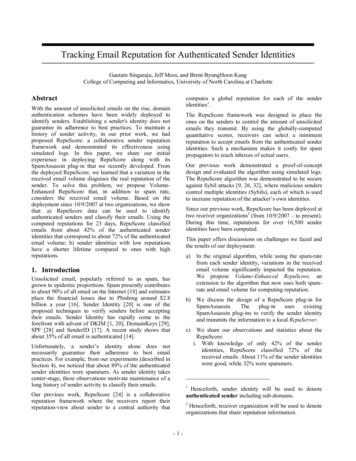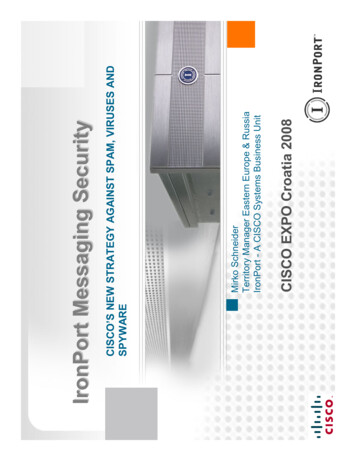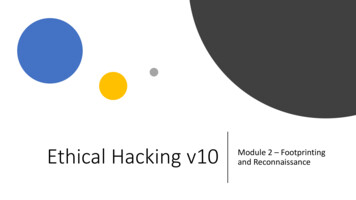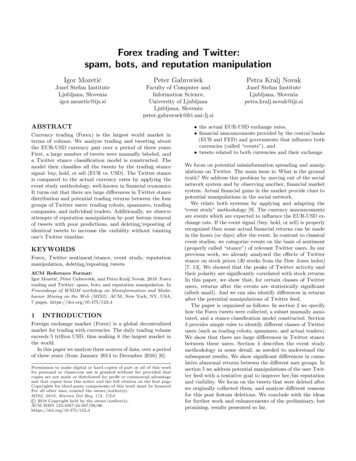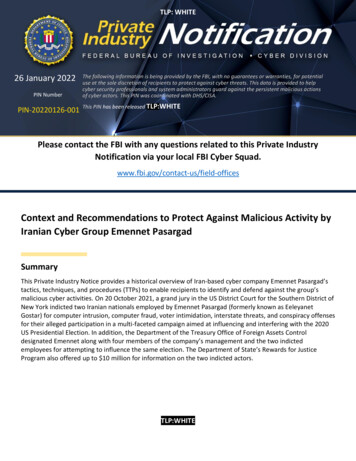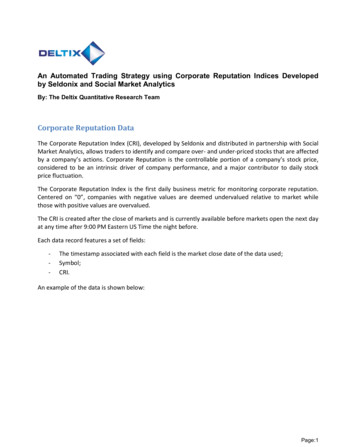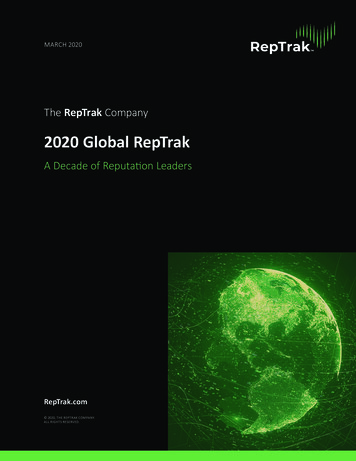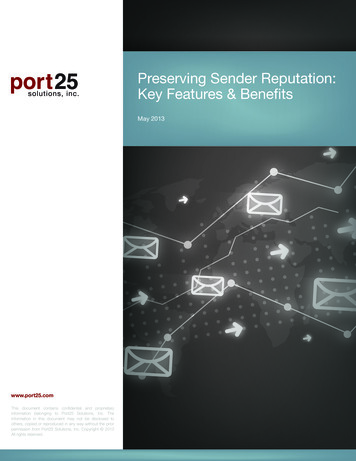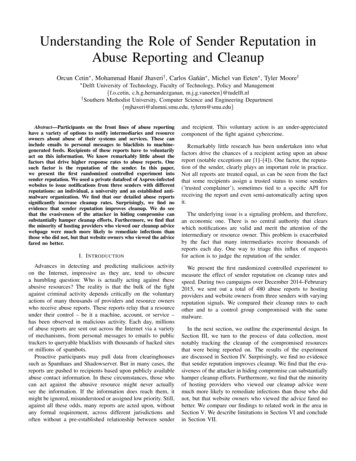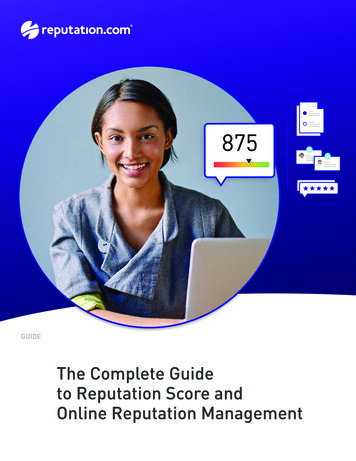
Transcription
GUIDEThe Complete Guideto Reputation Score andOnline Reputation Management
The Complete Guide to Online Reputation Management (ORM)ContentsIntroduction 3What is Online Reputation Management? 7Who Needs Online Reputation Management? 17Key Components of Your Reputation Score 27How to Launch an ORM Program in Your Organization 39Buyers Guide — What to Look For in an ORM Platform 48Resources 54Reputation.com2
The Complete Guide to Online Reputation Management (ORM)IntroductionWho is this guide for?Online reputation management (ORM) is the practice of engagingwith the community of people who use a search engine to findyou, rate and review your company, comment on your socialmedia pages or otherwise interact with your company online.A strong ORM program ensures that online business listingsare accurate, so people can find you. It enables you to harnessthe power of the conversations happening about you online toreinforce your brand promise.Before the internet and social media, consumers learned about companiesand products by asking friends, family members, neighbors and colleagues.Advertising, print directories, word of mouth and celebrity endorsementshelped companies attract business. Corporate websites were digitalrenditions of the traditional media world in which companies talked,consumers listened and Information flowed one way. This meant companiescould easily control complaints and negative sentiment.The balance of powerhas shiftedToday, the power rests with consumers, whoare co-creating brands online via star ratingsand reviews on search engines, social mediaand review sites.That balance of power shifted with the rise of Google, Facebook, Twitter andreview sites that favor the voice of customers over the call of brand marketers.Corporate websites no longer dominate the conversation, and a company’smarketing team and sales reps aren’t the only ones doing the talking.Reputation.com3
The Complete Guide to Online Reputation Management (ORM)5.0 Auto shop is totallyreliable. I wouldn’t goanywhere elseWhat is Reputation Score?Reputation Score is an indispensable index for every businessand the true measure of how your business is found, chosen andexperienced online and onsite.Measured on a scale of 100 to 1,000 and calculated using 9 unique factors,your Reputation Score helps you understand how your business andlocations stand relative to competitors and best-in-class benchmarks.Here are the components of yourReputation Score: Star ratings Review volume Review spread Review recency Review length Search impressions Listing accuracyReputation.com4
The Complete Guide to Online Reputation Management (ORM)Why Should You Care About Your Reputation Score?Reviews, comments and social media posts are everywhere youturn when looking for information about a business on the web— and they have a significant influence on buyer perception andbehavior.The impact of such awareness cannot be overstated. Your online reputationis a reflection of your overall brand and business health, and a leadingindicator of future growth — or lack thereof.For example, recent research on U.S. auto dealerships revealed that: 150 6PTSReputation Score%Avg. seasonally-adjusted sales-150 -13%PTSReputation ScoreRevenueSimilar findings apply in other industries, such as healthcare, wheresentiment about your brand on social media is a leading indicator of CAHPSscores, which affect reimbursement rates.Connection Between Reputation and RevenueThis direct connection between reputation and revenue, combined with the viral nature of today’sinformation flow, means a reputation can be created or destroyed in a micro-moment, and theimpact on business can be profound.Reputation.com5
The Complete Guide to Online Reputation Management (ORM)4.0/54.0/54.0/5What’s Inside This Guide?This guide provides a comprehensive foundation for managing yourcompany’s online reputation and improving your Reputation Score. It’s anessential resource to help you learn how to fully leverage ORM to: Improve your online visibility Attract new customers Increase customer conversion and retention Cultivate a loyal base of advocates Improve quality and efficiency of operations Drive revenueWho Should ReadThis Guide?Professionals in the fields of marketing, customer service, operations,compliance and risk, product development or any line of work thatnecessitates an understanding of how their company’s online reputationcan help or hurt business performance — will find this guide valuable.Reputation.com6
The Complete Guide to Online Reputation Management (ORM)What is Online ReputationManagement?Background and DriversThe internet has reinvented the way most people read, learn,shop, research and communicate. The dominance of onlinesearch (especially Google), the ubiquity of mobile devices,consumer impatience and the need for companies to moreeffectively engage in online conversations have combined forcesto completely transform the relationship between brands andcustomers.Mobile SearchPerhaps even more significant than the evolution of search engines isthe role played by smartphones in daily life. Between search and mobile,consumers constantly seek faster access to whatever they’re looking for, withthe minimum amount of effort.User-Generated ContentThe most potent — and complex — new playerin the brand marketing game, is user-generatedcontent (UGC). With millions of people writingbillions of comments, reviews and opinions onthousands of social media and review sites acrossthe globe, UGC is the wild child of the brandmarketing scene.With little to no control over what people post,businesses of all types and sizes have beenforced to come up with new strategies and toolsto tame the fast-growing child — or ignore attheir peril.Reputation.com7
The Complete Guide to Online Reputation Management (ORM)User-GeneratedContent (UGC)With millions of people writing billionsof comments, reviews and opinions onthousands of social media and reviewsites across the web, UGC is the wild childof the brand marketing scene.Reputation.com8
The Complete Guide to Online Reputation Management (ORM)“ Hey Siri, bring updirections to the closestgas station.”Google reports that “near me” searches on mobilehave increased 34-fold since 2011.First Impressions CountChances are, the first time potential customers are introduced toyou, they’re not looking at your strategically placed ads or yourkeyword-rich website, or even your beautiful product images.They’re looking at a search engine results page (SERP). If you happen toappear toward the top of the page, searchers will see your basic companyinformation, such as location, phone number, hours and a short descriptionof your business.Buyers are self-directed, highly informed and comfortable making fastdecisions based on the first thing they see online. If they don’t like what theysee, they move on — and you’ve missed your best chance to draw them in.Now more than ever, you don’t get a second chance to make a firstimpression.Reputation.com9
The Complete Guide to Online Reputation Management (ORM)Brand Management and Online ReputationManagement — What’s the Difference?Brand management focuses on shaping a perspective —influencing the way customers think of a brand in isolation.Online reputation management focuses on driving businessperformance based on customers’ real-life experiences.The table below describes some specific and important differences betweenthe two disciplines.Brand ManagementOnline Reputation ManagementBrand management tends to be guided by a historical pointof view. “How do we look compared to a year or five yearsago?” is a common question in brand management. It’sa slow-moving and low-engagement process, and brandvalue is typically measured in retrospect, annually or semiannually.Reputation management is very much “hereand now,” measuring and responding to actualcustomer feedback in near real-time.Brand management is distanced from specific customeractions and experiences, except when tied to a crisisor halo event — such as a new CEO with an unpopularagenda, or a customer issue that makes nationalheadlines.Reputation management is driven exclusivelyby customer feedback on specific events andexperiences.Brand management uses a limited set of data to establishbrand value, typically based off surveys, cold-calling oremailing a random sample of the public and asking foropinions of a brand — or corporate data such as earningsreports.Reputation management uses millions of datapoints from real-time customer feedback fromsurveys and on ubiquitous, non-exclusive reviewsites and social media platforms (Google,Facebook, Yahoo and industry-specific sites) tocapture sentiment from thousands of individualsthat have recent, real-world experiences with abrand.Brand management is optimized for very largeorganization with broad public “mindshare” and existingbrand recognition. It’s significantly less effectivefor smaller brands that don’t have a large profile inmainstream media or are not publicly traded.Reputation management can be applied toorganizations of any size and type, from smallauto dealerships and specialized medicalpractices to global retail and hospitality brands.Reputation.com10
The Complete Guide to Online Reputation Management (ORM)ORM ProvidesDetailed Roadmap3.0/53565.0/54.3/5788756Online reputation management gives companies a highly-detailed roadmap— down to the individual store or rooftop — enabling customer experienceenhancements that drive brand value and more business.Reputation.com11
The Complete Guide to Online Reputation Management (ORM)4.0 Jupiter CenterOpen. Closes 7PM.How Do Consumers Find You? Appear on Page 1 of search engine results pages (SERPs) Have a high star rating Have a large volume of recent, positive customer reviewsacross multiple sites Have relevant and engaging information in the rich snippetReputation.com12
The Complete Guide to Online Reputation Management (ORM)If you meet these criteria, consumers may do one ofthree things:Click to your websiteCall youGet directionsDoes the link take them to themost relevant section based onIs your phone number correct onyour location’s business listing?Is your address correct? Whatabout your hours of business?their inquiry?This combination of elements — your reputation as expressed quantitatively insearch results, and qualitatively in the accuracy and relevance of informationreturned to the user — can dramatically impact your business outcomes.And unlike many other aspects of the buyer’s journey, this is entirely withinyour control.What is the Rich Snippet?The rich snippet is the colorful row of information thatsits between the URL and the meta description in searchresults. It displays supplemental information aboutyour business that can include your star rating, reviews,pricing, product details and even recipe information.Principle 1Jupiter Center4.0(12) Jupiter CenterEast bay Bridge Center3.3 mi Emeryvile, CA (510) 602-9533Open until 10:00 PMYou have significant control over your online reputationexpressed through where you rank, what customers seeand how they respond online.Reputation.com13
The Complete Guide to Online Reputation Management (ORM)What’s Important to GoogleThe obvious impact of online reviews is that everyone can see your allimportant star ratings and what your customers think of you. What’s notas well-known is how much online reviews affect your visibility in searchresults, regardless of how well you perform in all other areas of SEO.4.0/54.0/5How Google RatesEvery user-generated review is treatedby Google as new, relevant content andis a critical factor in Google’s searchranking algorithm. But unlike an editorialcalendar or content strategy, companiescan’t plan for what people will post aboutthem online. This underscores the needfor companies to actively engage in onlineconversations, ensuring that the contentout there contributes positively to theirbrand image.Reputation.com14
The Complete Guide to Online Reputation Management (ORM)You Don’t Have To Go It AloneThere are multiple ORM vendors, platforms and service providers who canhelp you create and implement a program tailored to your business size,needs, and budget.Millennials RuleGuess who checks their mobile devices morethan 150 times a day, and is the fastest-growinggroup of consumers, accounting for 170 billion inpurchases each year? That’s right: Millennials —the 91 million people born between 1982 and 2003.They are also the most active participants in theconsumer feedback game, more likely than anyother group to share their experiences on Google,social media and review sites. Fifty-nine percentmake product recommendations to share highlypositive or negative experiences, and 41 percentpass those recommendations to friends and familythrough social networking.A whopping 83% of them say they don’t trustadvertising and they aren’t impressed by celebrityendorsements. Instead, they rely on referralsfrom friends and online reviews as their primarysources of information about products andservices.Principle 2Reviews and star ratings are critical to your business today,and increasing in relevance as purchasing power shifts todigital natives.Reputation.com15
The Complete Guide to Online Reputation Management (ORM)4.0/5756You’ve Been Found and Chosen. Now What?Star ratings, SERP results and online listings are just the public face ofhundreds, thousands or possibly even millions of data points about yourbusiness on the social web — consumers commenting on everything fromthe speed of your website to the cleanliness of your bathrooms to theefficiency of your staff.That underlying data set, when organized within an ORM platform, providesmetrics and details about how your business is performing location tolocation, across your organization and relative to your competition. Mostcritically, it provides a comprehensive, specific blueprint for businessimprovement.Listen, Connect, ActIf you listen to your customers, take their input to heart and adapt your business based on whatthey’re telling you, you’ll cultivate happier customers, reduce churn and build advocacy andloyalty.Reputation.com16
The Complete Guide to Online Reputation Management (ORM)Who Needs OnlineReputation Management?Every Business Has a Reputation to Protectand DevelopReputation risk is tangible and directly impacts the bottomline of every single business. Harvard Business Schoolresearch indicates a measurable revenue variance of 9%per reputation star.Considering that most retail and services businesses operate at a netprofit margin below 10%, your online reputation could be the single biggestelement that governs financial success or failure.Stock plummets due to negative viral socialmediaCase in point: In 2017, United Airlines’ reputationplummeted, its stock falling 1.1% and its market cap takinga 1.4 Billion nosedive overnight, following the forcibleremoval of a passenger that was captured on video andwent viral on social media. The 1.4Bn haircut onApril 11, 2017, followed a 20X surge in (negative) brandmentions the previous day.The tangible value of a company’s reputationFor example, many sources have shown that enterprise value — both presentshare price value and future underlying commercial value — is heavily correlatedto corporate reputation. The Economist Intelligence Unit has said that as muchas 75% of a company’s value is based on its reputation.Reputation.com17
The Complete Guide to Online Reputation Management (ORM)4.4 I like the new designs.It’s super close.Going now.While every business or government entity can benefit from ORM, it isparticularly important for B2C, service- and experience-focused industriesthat include retail, hospitality, healthcare, automotive, financial services andproperty management.Retailers Gain or Lose Customers inMicro-MomentsRetailIn 2016, Google coined the term “real-time, intent-driven micromoments” to describe those split-second decisions to search forsomething online. Consumers grab their phones and type in orspeak a search term because they want to know something, gosomewhere, buy something or do something — right now.These are the moments during which brands must now battle itout for consumers’ attention and dollars.Reputation.com18
The Complete Guide to Online Reputation Management (ORM)Be found at key micro-moments across the customerjourney when customers want to:KnowGo66%of smartphone usersturn to their phonesto learn more aboutsomething they saw inan ad.Do702X“Near me” searcheshave grown 2X (between2017 and 2018).Buy%Searches related to“how to” on YouTube aregrowing 70% year-overyear.82%of smartphone usersconsult their phonewhile in a store. Mobileassist in purchasesacross channels.But search results pages arebrutally unforgivingResults pages are especially unforgiving on the smallscreens of mobile devices. With limited space to presentresults — and limited motivation by shoppers to click orscroll — the top three businesses may be the only thingspeople see. So if you don’t show up in the 3-pack of searchresults, you’ve lost the micro-moment battle.If retailers hope to cash in on the millions of micromoments that now govern consumer behavior, an onlinereputation management solution is essential to get themto the top of those search results and gain new customers.Reputation.com19
The Complete Guide to Online Reputation Management (ORM)Yes, I would recommend thislocation to a friend. I wishthere were more dressingrooms though.CASE STUDY: RetailNational Retailer Uses Surveys to BoostResponse Rates, Positive Reviews andSearch Rankings 67%80Positivereviews After implementing a new, integrated survey systemacross its 1,200 stores in the U.S., a national retailerexperienced a 67% increase in positive reviews and ahuge boost in average star ratings in just one year.%of locations rankin top three inGoogle searchresults.Now that this retailer is fully tuned in to its customers’voices, almost 80% of its locations rank among the topthree in Google Search results, and 99% of them rankin the top ten, beating its main competitor in the allimportant online search game.Reputation.com20
The Complete Guide to Online Reputation Management (ORM)HealthcareHealthcare consumers shop around too — and haveeven higher expectations of your digital presence.The rise of the empowered healthcare consumer hastransformed the way providers attract and serve patients.Consumers now have a voice — and it’s powerful. Awards andaccreditations don’t mean much without a strong reputation toback them up; only organizations who improve their providers’online reputation will thrive in this new marketplace.Most healthcare seekers start theirsearch onlinePew Research found that 77% of online healthseekers start at search engines — and whatthey find in their search often helps them decidewhere to go for care. They don’t just look at starratings; they pore over online reviews to gain asmany perspectives as possible before makingtheir choice.Savvy healthcare marketers are taking advantageof this unprecedented opportunity to listento consumer concerns, take action to correctthem, improve the overall patient experienceand, most importantly, turn patients into theirbest advocates and marketers. For providers itdoesn’t end there. Healthcare is as competitive abusiness as any other, and it’s heavily dependenton consumers being able to book appointmentswith physicians and specialists.Comprehensive, fast-loading doctors’ pages may seem like a no-brainer, butmost healthcare providers’ websites are not optimized for “closing the deal.”Smart providers have invested in listing management and page optimizationsoftware — ideally as part of their ORM platform — to make the customerexperience seamless from first click to appointment.Reputation.com21
The Complete Guide to Online Reputation Management (ORM)CASE STUDY: HealthcareWhat One Fortune 500 Healthcare ProviderDid When Patients Were Looking Onlineand Walking AwayRead how a large healthcare organization turned around their onlinepresence with a structured ORM program that, in just two years,produced dramatic results:AdmissionsClinical Quality Index 100 450Employee TurnoverEarnings-15 200Reduction by almost 15%Over their target%Exceeded goals%%Improvement%Reputation.com22
The Complete Guide to Online Reputation Management (ORM)Auto Dealers Get a Measurable Sales BoostAutomotiveIn the automotive industry, the car buyer’s journey to a dealershipshowroom begins with an online search. In fact, 90% of new carbuyers do a majority of their research online. By the time theyphysically walk into a showroom, research is largely complete, andthey’re ready to buy.Step one for dealerships is getting to the top of online search results toensure they’re visible when customers are in buying mode. But even then,a high search result or clever advertising strategy is no longer enough topersuade searchers to click on a link.Car Buyers Focus on Online ReviewsCar buyers seek out dealerships with strongpositive comments about the buying and closingexperience. For auto dealers, it’s essential toimprove the overall experience for customers— and the best source of information foropportunity areas is the free-form text in onlinereviews and social media posts.Deep Insights for OEMsThe best online reputation managementplatforms combine social listening withreview management and customer surveysto provide dealers, dealer groups andOEMs with deep insight into customersentiment and brand satisfaction.Reputation.com23
The Complete Guide to Online Reputation Management (ORM)CASE STUDY: AutomotiveA Big Three Automaker Wins Big with OnlineReputation ManagementA Big Three automaker was looking to improve sales by raising the visibilityand online reputation of its dealerships across the U.S. Reputation.comworked with them to increase review volume, improve star ratings and boostdealer prominence in local search. As a result:Reviews 325%Increase inreview volumeStar rating3.5 4.5Average star ratingrose to 4.5Negative reviewsPositive reviews-30 7%%Decrease innegative reviewsIncrease inpositive reviewsReputation Score 250PTSales 6%An increase in Reputation Score of 150 points led to a6% increase in average seasonally-adjusted salesReputation.com24
The Complete Guide to Online Reputation Management (ORM)Property Management Firms Increase Occupancyand Renewal Rates, Maximize Net Operating IncomePropertyManagementApartment seekers start their research online, and 98% of themread online reviews during their search. They won’t visit yourproperty without proof that the amenities and pictures on yoursite match what tenants say it’s like to live there. And accuratebusiness listings are a must, especially for property managerswith multiple locations.Conventional wisdom states renters will only post online reviewswhen they have a complaint. But the Reputation.com 2018 PropertyManagement Research Report reveals that, in fact, tenants aretwice as likely to make a positive comment about customer serviceas they are a negative comment. Inviting current tenants to postreviews has multiple benefits, including a more representativepicture of overall tenant experience, better visibility and searchresults and higher star ratings. It requires a proactive effort on thepart of property managers. Implementing a process for constantlyrequesting reviews from prospective, current and past tenants atall locations is critical.24/7/365 relationshipUnlike many other transactions, property rental is a 24/7/365relationship. Retail shoppers don’t throw a fit (or write scathingreviews) if they find your store is closed at 7:00 pm the day beforeThanksgiving — especially if you’ve updated your holiday hourson your Google My Business and Maps pages. For a propertymanager, there is no “come back later” option. The more effectiveyou are at responding to customer requests, the fewer will turn intocomplaints and negative reviews.By integrating your social listening, review management and customer surveytool with a customer service and ticketing system, you can track specific issuesand ensure they’re addressed before they negatively impact occupancy rates.Reputation.com25
The Complete Guide to Online Reputation Management (ORM)CASE STUDY: Property ManagementOnline Reputation Success in PropertyManagementWith multiple communities to manage in five different states, a U.S. propertymanagement firm had outgrown their manual process of managing online tenantsentiment. They needed a solution that would automate their manual processesand improve their ability to collect and respond to tenant feedback in a timelymanner, encourage residents to share their positive living experiences online, andmanage what others were saying about their properties.After implementing Reputation.com’s ORM platform, the firm:Increased positive reviews by 400%Decreased negative reviews by 10%Increased average star ratings by 26%Most importantly, they’re now able to listen to and engage withresidents and provide a superior living experience.Reputation.com26
The Complete Guide to Online Reputation Management (ORM)Key Components ofYour Reputation ScoreYour Reputation Score represents your ability to do three things:Be found, get chosen and improve experience. Each of thoseimperatives are impacted by how well you manage the variouscomponents of ORM:Be FoundOptimize search with accuratelistings data, more positivereviews and higher rankings.ImproveExperienceEnhance service quality withinsights from reviews, socialmedia and surveys.Get ChosenDrive conversion with betterlocation pages, directories andsocial advertising.Reputation.com27
The Complete Guide to Online Reputation Management (ORM)Be Found:Help People Find You with Accurate Business ListingsWith four out of five consumers using search engines such as Google to findbusinesses, accurate business listings are essential. Inaccurate listingserode trust and credibility, affect search results and ratings, and can deliveryour customers right into the hands of your competitors.Find a clinicnear meAccurate business listings driveconsumer behavior that increasesrevenueIt’s essential that you audit, claim and correct allyour online locations’ business listings. Google MyBusiness is critical, but your locations are listedon many other sites, as well. Implementing aprocess for auditing and correcting your listings atscale helps ensure consistency and accuracy.Drive Conversions with Directory ManagementThe larger your organization, the more important it is to establish a singlesource of truth so that information about your locations (address, hours,appointments, availability and so on) and the people who work there(credentials, reviews, schedules) is always updated and accurate. This isparticularly critical for healthcare organizations and the physicians and otherproviders who work there.Directory management gives you the power to easily centralize, update, andshare this data from one place. By pulling data from internal sources andexternal sites, directory management ensures that clean data populates yourwebsite, search engines (Google, Bing) and industry specific sites (such asDoctor Finder, Find a Dealer or Store Locater).Reputation.com28
The Complete Guide to Online Reputation Management (ORM)Enable Fast Website Searching with Finder/LocatorFinder/Locater leverages autocomplete and customizable filters against yourcategorically organized directory information, to drive site visitors to yourlocations and professionals specific to their needs — while also providingreal-time referral management and appointment scheduling — in onesolution.Get Chosen:Monitor, Request and Respond to ReviewsThe search experts at Moz report that review signals, such as the recency andnumber of your reviews are top-ranking factors in Google’s algorithm. And69% of consumers say reviews older than three months don’t count. You can’tafford to wait for reviews to roll in — you have to ask for them.Make sure your strategy for review requesting includes mobile/SMS as wellas email. If you’re relying on paper surveys or point-of-sale placards askingcustomers to review you, you’re not going to generate enough review volumeto significantly improve your online reputation.Reputation.com29
The Complete Guide to Online Reputation Management (ORM)Best Practices For Responding To Reviews Be sure to respond promptly — preferably within 48 hours of receiving areview. Address negative reviews quickly and thoroughly. Don’t risk letting anegative review go viral by letting it fester. If the review is negative but legitimate, own up to it and offer to discuss theproblem one-on-one. Avoid getting into arguments online. If the review contains false information or is unnecessarily insulting, takethe opportunity to correct the information — without returning the insult.You may be able to win over an unsatisfied customer.Be Active on Social MediaSocial media, by definition, is a communications channelthat enables users to post and share their own content.For any company to simply have a social media presenceand use it as an additional advertising channel is wastingthe unique opportunity to connect with its audience at ahuman level.Actively engaging with your followers — which meanslistening to their feedback, responding thoughtfully to it,and, if necessary, acting on it — creates avid fans, drivessite traffic and gets the word out about positive reviewsand feedback. Strategic, targeted social advertisementscan help raise brand awareness, as well.Reputation.com30
The Complete Guide to Online Reputation Management (ORM)Create Transparency andTrust: Livestream YourReviews Right to YourWebsiteWhat’s the best way to create transparency and build trust between you andpotential customers? Livestream your reviews right on your website, usinga widget. Take advantage of
What is Reputation Score? Reputation Score is an indispensable index for every business and the true measure of how your business is found, chosen and experienced online and onsite. Measured on a scale of 100 to 1,000 and calculated using 9 unique factors, your Reputation Score helps you understand how your business and
